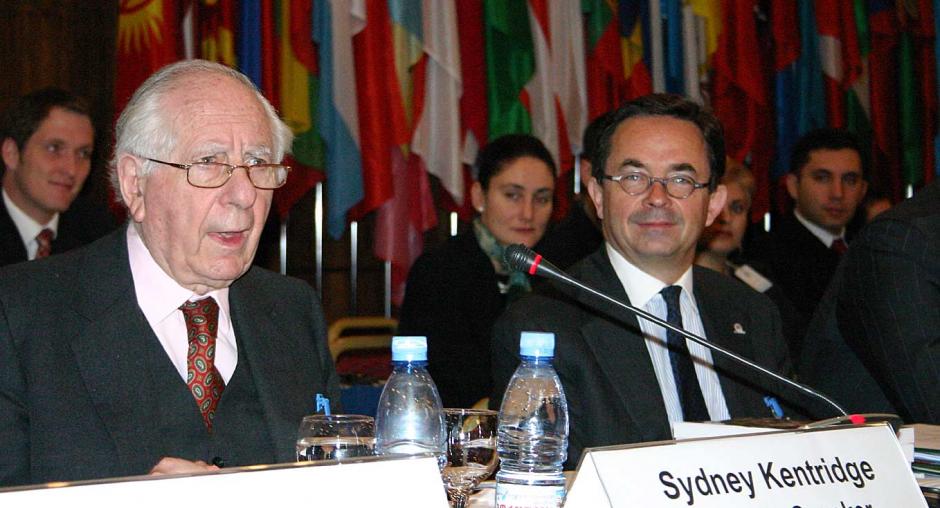Newsroom
OSCE conference calls for better protection of defence lawyers
TBILISI 4 November 2005

(OSCE/Curtis Budden)Keynote speaker Sir Sydney Kentridge QC (left) with Ambassador Christian Strohal, at a meeting on the role of defence lawyers in guaranteeing a fair trial, Tbilisi, 3 November 2005. (OSCE/Curtis Budden) Photo details
TBILISI, 4 November 2005 - The first major international conference to focus on the role and rights of defence lawyers, organized by the OSCE, ended today in the Georgian capital.
The two-day event brought together more than 300 participants, including representatives of 126 non-governmental organizations, as well as governmental representatives, lawyers and legal experts
"Defence lawyers are front-line human rights defenders," said Ambassador Christian Strohal, Director of the OSCE's Office for Democratic Institutions and Human Rights.
"The marker of a society that truly respects human rights and freedoms is when lawyers can freely and without obstruction represent those who are the most condemned, feared, or hated, to ensure that their rights are fully respected. These are the cases that challenge how strongly fundamental human rights protections are guaranteed."
This was the first OSCE-organized international conference to be held in Georgia.
Participants voiced concern over a number of issues, including access to legal counsel, government interference in the work of the defence, and violations of the lawyer-client privilege by the state.
"If you wish to belong to the community of nations who believe in democracy and in respect for the rights of the individual citizen, then you must accept that government itself must be subject to the rule of law," said Sir Sydney Kentridge, Queen's Counsel.
"And the rule of law cannot exist unless every effort is made to ensure that all trials, large and small, are fair. To achieve that, the state must ensure that there are not only independent judges, but also fair prosecutors and competent and independent defence lawyers. Without this last element, nothing else would count."
The conference generated a significant number of recommendations for states, as well as for the OSCE itself.
One recommendation was that the power to authorize detention be removed from prosecutors, that states ensure transparent admission to legal practice on a non-discriminatory basis, and that states ensure that lawyers' communication with their clients be completely confidential.
The two-day event brought together more than 300 participants, including representatives of 126 non-governmental organizations, as well as governmental representatives, lawyers and legal experts
"Defence lawyers are front-line human rights defenders," said Ambassador Christian Strohal, Director of the OSCE's Office for Democratic Institutions and Human Rights.
"The marker of a society that truly respects human rights and freedoms is when lawyers can freely and without obstruction represent those who are the most condemned, feared, or hated, to ensure that their rights are fully respected. These are the cases that challenge how strongly fundamental human rights protections are guaranteed."
This was the first OSCE-organized international conference to be held in Georgia.
Participants voiced concern over a number of issues, including access to legal counsel, government interference in the work of the defence, and violations of the lawyer-client privilege by the state.
"If you wish to belong to the community of nations who believe in democracy and in respect for the rights of the individual citizen, then you must accept that government itself must be subject to the rule of law," said Sir Sydney Kentridge, Queen's Counsel.
"And the rule of law cannot exist unless every effort is made to ensure that all trials, large and small, are fair. To achieve that, the state must ensure that there are not only independent judges, but also fair prosecutors and competent and independent defence lawyers. Without this last element, nothing else would count."
The conference generated a significant number of recommendations for states, as well as for the OSCE itself.
One recommendation was that the power to authorize detention be removed from prosecutors, that states ensure transparent admission to legal practice on a non-discriminatory basis, and that states ensure that lawyers' communication with their clients be completely confidential.
